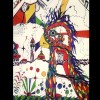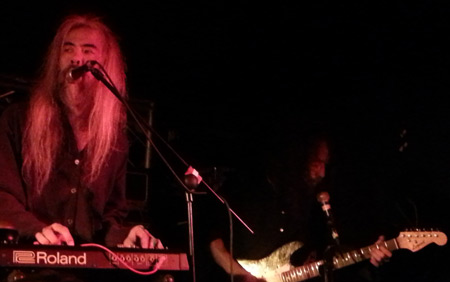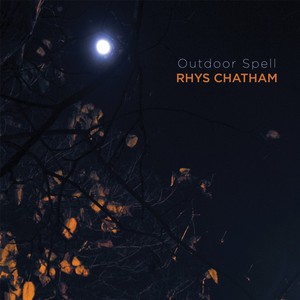 Where do I begin – with a simple statement perhaps? Like “this is one of the most important Krautrock albums made during the ’70s,” perhaps? It certainly stands singular amongst most of it contemporaries at the time (1974); it is unique and it’s difficult when reviewing it to find cultural points of reference to allude to. But here goes…
Where do I begin – with a simple statement perhaps? Like “this is one of the most important Krautrock albums made during the ’70s,” perhaps? It certainly stands singular amongst most of it contemporaries at the time (1974); it is unique and it’s difficult when reviewing it to find cultural points of reference to allude to. But here goes…
“Kriegsmaschinen, Fahrt Zur Holle” has a lower register chugging synth* pattern, like the sound of a machine heard from a distance. VCS3-sounding synth wobbles over the top whilst bass rumbles in the background. The guitar picks out stray notes from the battlefield and every now and then the music swells as if you are slowly coming up on some trip. Schickert’s desert guitar begins to take over and it’s only within the background loops of guitar that I begin to hear something reminiscent of Ash Ra Tempel within its style; however, because this is a war machine from hell, the atonal notes stop the piece from straying into the cosmic bliss-out territory of Ash Ra. The background guitar rhythm begins to pick up pace and another guitar stabs over the top with a liquid synth line running underneath. Vocals are restrained and delivered through a barrage of reverb. The guitar begins to argue with itself and here I can see an influence on later bands like Die Haut as it crashes into chaotic reverb madness. By this point you think the machine is on top of you and then Schickert lifts you off into the cosmos with some out-there space synth to ease the oppression as the track closes.
“Wald” is the final track on the album and is a massive 22 minute epic. Chugging guitar work plays over a sequenced synth to give an almost trance-like feel. The guitar plucks away in a repetitive manner, creating a strong rhythm where a faint melody can be heard over the top. This begins to fade and we move on to the next section. Here the guitar plays a gentle hypnotic tune while the synth plays a soft melody buried into the background by a bubbling stream of guitar and gentle keyboard notes. Schickert describes the track as “a walk through landscapes on a comfortable small way suddenly crossed by a huge highway with shuttering machines.” During this section the piece does have a certain laid-back feel of a stroll, however, constantly hinted at in the background is the noise of oncoming traffic. There is, again, a certain sense of unease within the music; this is not Eno’s pastoral ambience – it has the wonder and fear of walking through an alien landscape. The third section brings in hovering echoed guitar that is as light as a summers breeze; then beneath this the tension begins to build. Here the machine noise gets louder until it overpowers the sounds of nature. The industrial rhythms in the guitar and synth grow more forceful, every now and then the track retreats back to its gentler mood to be swallowed by the noise again until its final drifting coda.This CD reissue comes with a short essay by Schickert and another by Emil Amos about the album. This is a real must-buy reissue and if you don’t have a copy snap up one while it’s still around. Schickert’s album stands gazing across time hopefully to be discovered by a new set of people. It’s not a work frozen in amber – it still sounds new and vital and remains an incredible achievement for something that was recorded in such a primitive way. This record is as important as anything that Tangerine Dream, Can or Kraftwerk recorded during this period, and I hope that maybe Important will begin to release some new music from Schickert – or at least unheard tapes from the vaults.
-Gary Parsons-
[* Günter Schickert has since been in touch to point out that there are in fact no synths at all on Samtvogel – which makes it all the more impressive. Ed.]




One thought on “Günter Schickert – Samtvogel”
Günter Schickert’s “Samtvogel” “is as important as anything that Tangerine Dream, Can or Kraftwerk recorded… http://t.co/k3oGvwJZpF